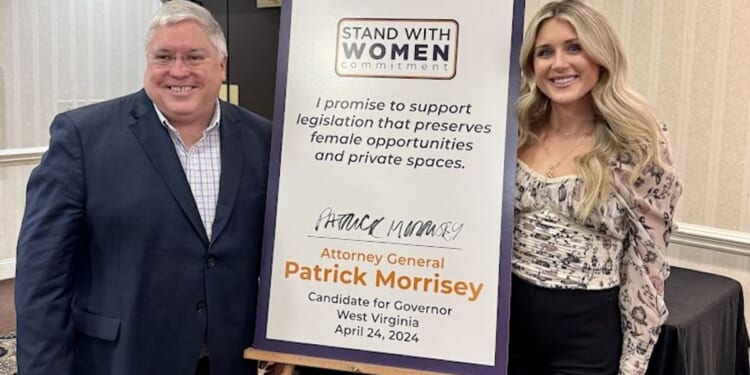
Twenty-five states have approved measures barring transgender athletes from girls’ and women’s scholastic sports, but West Virginia could become the first to have its law taken up by the Supreme Court.
West Virginia Attorney General Patrick Morrisey announced he will ask the Supreme Court to consider the constitutionality of the 2021 Save Women’s Sports Act after the 4th U.S. Circuit Court of Appeals denied last week his motion to enforce the law.
“At its core, this is a matter of common sense,” Mr. Morrisey said Wednesday at a press conference. “You can’t fairly ask a girl or a woman to compete against a biological male. It’s not right, and it’s just plain wrong, and West Virginia parents know this.”
Mr. Morrisey, who is running for the Republican gubernatorial nomination, said he would submit a motion within the next month asking the Supreme Court to grant a writ of certiorari.
“This is a significant case to bring to the Supreme Court, and it will potentially set precedent for the entire country,” he said.
All-American swimmer Riley Gaines joined him as he signed the Independent Women’s Voice’s “Stand With Women Commitment, a pledge in which candidates promise to “support legislation that preserves female opportunities and private spaces.”
The WV AG spoke alongside Riley Gaines at the Capitol today to discuss fairness in women’s sports. The AG gave a major update in the case following a 2-1 ruling handed down by the United States Court of Appeals for the Fourth Circuit last week.
VIDEO: https://t.co/psc1IT9jqw
— WV Attorney General (@WestVirginiaAG) April 24, 2024
The 4th Circuit ruled 2-1 in favor of Becky Pepper-Jackson, a 13-year-old transgender athlete represented by the American Civil Liberties Union and Lambda Legal, finding that the West Virginia law violated the Equal Protection Clause and Title IX by barring her from competing based on gender identity.
“West Virginia’s effort to ban one 13-year-old transgender girl from joining her teammates on the middle school cross country and track team was singling out Becky for disparate treatment because of her sex,” Lambda Legal Staff Attorney for Youth Sruti Swaminathan said after the April 16 ruling. “That’s discrimination pure and simple, and we applaud the court for arriving at this just decision.”
Two days after the court’s ruling, Becky won the girls’ shot-put competition at the Harrison County Middle School Championships, outdistancing the second-place student by more than three feet.
Five girls from a competing middle school protested by entering the circle when their names were called and then exiting without making a throw.
“I was incredibly impressed to see the brave girls that stood up for their rights. And they’re here,” Mr. Morrisey said. “We know that they stood up because they refused to compete against a student with an unfair competitive advantage.”
It’s by no means certain that the high court will agree to hear the appeal. Four of the nine justices from the Supreme Court must agree to accept a case.
Several states are fighting challenges to their Save Women’s Sports laws, but West Virginia is the first state in a position to bring its case to the Supreme Court after losing in the federal court of appeals.

